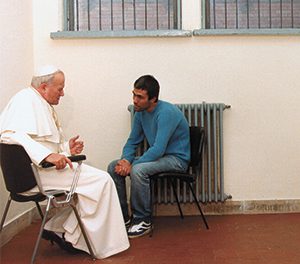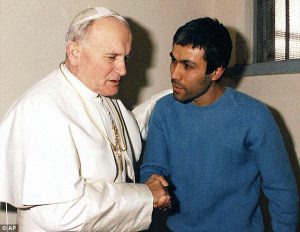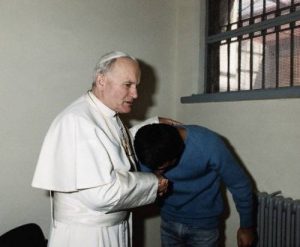Let’s start with what seems to be a normal day for St. John Paul II on May 13, 1981.
A year after being shot, St. John Paul II said, “In the designs of providence, there are no mere coincidences.” He recognized that he was shot on the feast day of Our Lady of Fatima and said, “One hand shot, and another guided the bullet,” meaning he believed our Mother Mary saved his life (Cardinal Stanisław Dziwisz, A Life with Karol: My Forty Year Friendship With the Man Who Became Pope, 136).
In spite of all the suffering in his life, with his mother dying when he was eight, his older brother dying when he was eleven, his father dying when he was 21, being hit by a car, being oppressed by the Nazis and then by the communists, he was convinced that God had a plan. For him, there’s no such thing as a coincidence. And so he was a man of hope.
How about us: What’s the hardest thing we’re going through right now? Are we hopeful? Is it a coincidence that all this is happening to us, for no reason? Or is there a greater plan?
There are a few clues from today’s Gospel as to how God operates in our lives.
Jesus meets the Samaritan woman at a well. 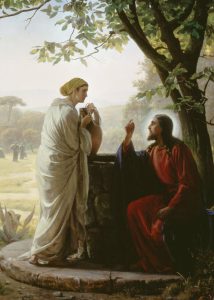 In the Old Testament, Isaac met his future wife Rebekah at a well (Gen 24:10-67), Jacob met his future wife Rachel at a well (Gen 29:1-30), and Moses met his future wife Zipporah at a well (Ex 2:15-21). And now, Jesus meets the Samaritan woman at a well, when just one chapter before in St. John’s Gospel, St. John the Baptist described Jesus as… the bridegroom (Jn 3:29)! Huh, what a coincidence.
In the Old Testament, Isaac met his future wife Rebekah at a well (Gen 24:10-67), Jacob met his future wife Rachel at a well (Gen 29:1-30), and Moses met his future wife Zipporah at a well (Ex 2:15-21). And now, Jesus meets the Samaritan woman at a well, when just one chapter before in St. John’s Gospel, St. John the Baptist described Jesus as… the bridegroom (Jn 3:29)! Huh, what a coincidence.
 Then, when Jesus dialogues with the Samaritan woman, it turns out she’s had five husbands. That’s interesting, because the Samaritan people were originally Jewish people who inter-married with five foreign tribes, and those tribes gave them five false gods, who were addressed as ‘Baal,’ meaning ‘husband’ (Scott Hahn & Curtis Mitch, The Ignatius Catholic Study Bible, 168). Wow! What a coincidence.
Then, when Jesus dialogues with the Samaritan woman, it turns out she’s had five husbands. That’s interesting, because the Samaritan people were originally Jewish people who inter-married with five foreign tribes, and those tribes gave them five false gods, who were addressed as ‘Baal,’ meaning ‘husband’ (Scott Hahn & Curtis Mitch, The Ignatius Catholic Study Bible, 168). Wow! What a coincidence.
We didn’t hear it in today’s Gospel, but just one verse before today’s reading, the Bible says that Jesus “had to pass through Samaria” (Jn 4:4). But He didn’t have to pass through there because Jewish people always went around Samaria, because Jews and Samaritans were enemies. This means that none of this was coincidence, but that He had to pass through there because He wanted to redeem the Samaritan people, showing that He’s the real bridegroom and that they were meant to marry Him, instead of worshipping five false gods.
There was a young man named Bob Spitzer from Hawaii who was studying business administration at Gonzaga University in Washington State, about 6.5 hours from here. He tells the story of how, one day, he just happened to be walking by a philosophy class right when the professor was talking about proving the existence of God. He doubted this was possible, so he slipped into the back of the class to hear the whole lecture. Afterwards he talked to the professor telling him that he didn’t think it was possible to prove God’s existence. The professor invited him to take the course the next semester, which he did, and this opened up a whole world for him.
The next year, a girl he liked invited him to a retreat. When he said he wasn’t the “retreat type of guy,” she was so disappointed that she accused him of being heartless. It got him thinking: “Maybe I don’t have much of a heart—maybe I ought to do some work on that.” So he went and truly experienced the love of God in his heart.
Later on, another girl he liked invited him to teach catechism. He thought he couldn’t do it, but she persisted! He relented, and after teaching his first class, he came to love the students and love teaching so much so, that he started taking philosophy and theology courses. He became a priest and one of the best theologians in the world. One of his specialties is proving the existence of God through philosophy, astrophysics and mathematics.
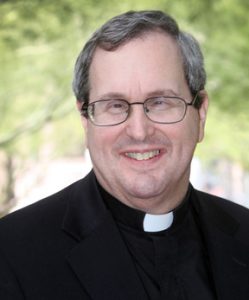 All these events weren’t just accidents, but God opening up doors. The now Father Spitzer says it’s the “Holy Spirit’s favorite tactic… to draw us into an opportunity, then open doors into that opportunity” (Five Pillars of the Spiritual Life, 118-120). That’s why we should pay attention to the doors the Holy Spirit opens for us, and, on our part, invite other people to different Catholic/spiritual events, because we’re opening up doors to bring them joy!
All these events weren’t just accidents, but God opening up doors. The now Father Spitzer says it’s the “Holy Spirit’s favorite tactic… to draw us into an opportunity, then open doors into that opportunity” (Five Pillars of the Spiritual Life, 118-120). That’s why we should pay attention to the doors the Holy Spirit opens for us, and, on our part, invite other people to different Catholic/spiritual events, because we’re opening up doors to bring them joy!
When we see God’s hand maneuvering in our lives in beautiful ways such as these, we should recognize it and praise Him. But what do we do when we see so many bad things happening to us? Of course, God doesn’t want us to sin or be hurt, but, because of freedom, He allows it. So, whenever bad things happen to us that are beyond our control, we shouldn’t resent them, but accept that God is allowing it as part of His plan (more on this below). He uses bad things, even our sins, to bring about a greater good. God the Father, for example, never wanted us to cause the death of Jesus, but we did so through our sins; but He used it to show us how much He loved us by allowing His Son to die for us.
The past few years, people have asked me why I came back from Rome when I was supposed to be on a life-long assignment to the Vatican diplomatic service. In hindsight, it was like a perfect storm to get me home. After I came home, I wondered, “Why did Archbishop Miller send me, when I never knew a second language?” Speaking multiple languages is a necessity for the diplomatic service and I was the only one there who arrived at the diplomatic academy with no second language. “Why didn’t he send my classmate, Fr. Alessandro, who already spoke Italian perfectly?” For me, functioning in a foreign language was terribly difficult; I described it as ‘living in a prison.’ “Why was it that, two weeks after I arrived in Rome, after a general physical examination, the doctors discovered that I have a dangerously low level of platelets in my blood (the cells that coagulate blood and help stop bleeding), a problem I never had before? Was it because of all the pizza I was eating?” “Why was I sent to a bad program with no other native English speakers with me when, had I been sent to another pontifical university, I would have been surrounded by Canadian, American, British students, etc.?”
The answer was it was a perfect storm of factors pointing me to come home. I would stay if my superiors wanted it, but, because I struggled so much with languages and because it was likely that I would be sent to foreign countries with poor medical care and I was already at risk for blood problems, I made a request to come home, and, providentially, all five of my superiors involved in the decision agreed it was the right thing to do.
But why did God send me there in the first place? To help me become more of a man. I matured a lot through the suffering, and when I came back, I learned to stand up for myself, not let myself be pushed around, and became more secure in who I was.
And if it was like a perfect storm in terms of obstacles, it was also a perfect storm in terms of the help I received, enough to help me survive. I had two amazing American spiritual directors who guided me in those three years, and I met my cousin, Fr. Danny Huang, who ‘happened’ to be stationed in Rome six months before I got there. He became a great friend (even though he’s 21 years older than I) and helped me so much. The one person who saved my life in first-year classes was a kind Slovakian priest whose English was good enough to help me (and get me the notes from the Italian students!). It was extremely hard, but a perfect plan by God to get me to mature.
One of the hardest lessons for us to accept is that God wants us to be tougher. We Christians talk so much about meekness, gentleness and kindness, which are important, but God also wants us to be tough adults, who don’t cower and give up at every difficulty, and who can stand up against injustice. Love is tough! It says in the Bible, “Stern as death is love” (Song 8:6). So God often maneuvers things in our lives to challenge us so that we can be so strong that we’ll never stop loving, no matter what, because that’s how He is.
There’s a reason why you’re all here today. There’s a reason why your hair is going grey and you’re losing so much of it. There’s a reason why so many good things are happening to us, and why so many bad things happen to us: God uses all of them to make us more like Him.
It’s true that we often can’t see the reason when we’re in the midst of suffering. I know how hard that is. But that’s part of maturing in trust: We keep on doing what’s right and loving, knowing that our Father is good.
 So here are three simple things we can do to live this out: 1) How about we try to avoid saying, “Good luck,” or “That was lucky.” (Even Obi-Wan Kenobi said there’s no such thing as luck.) I know many of us say it without meaning we believe in some mysterious force, but every time we say this we weaken our conviction that God has a plan. Instead of saying to people, “Good luck,” let’s say, “I’ll pray for you,” and mean it—that is, we’ll really pray for them and not just say it. Do you know how many non-Christian people love being told that we’ll pray for them? They love it! But, let’s say we’re still not ready to use spiritual language with our non-Christian friends, let’s just say something like, “I hope you have a great day,” or “I hope you do well!”
So here are three simple things we can do to live this out: 1) How about we try to avoid saying, “Good luck,” or “That was lucky.” (Even Obi-Wan Kenobi said there’s no such thing as luck.) I know many of us say it without meaning we believe in some mysterious force, but every time we say this we weaken our conviction that God has a plan. Instead of saying to people, “Good luck,” let’s say, “I’ll pray for you,” and mean it—that is, we’ll really pray for them and not just say it. Do you know how many non-Christian people love being told that we’ll pray for them? They love it! But, let’s say we’re still not ready to use spiritual language with our non-Christian friends, let’s just say something like, “I hope you have a great day,” or “I hope you do well!”
2) Don’t get impatient with bad traffic or waiting in line-ups. Remember: if something bad is happening to us and it’s beyond our will or choice, then there’s no point in resenting it or complaining about it. We just accept it as God teaching us patience or to leave earlier(!) or listen to those Lighthouse Catholic Media CDs from the back of the church. When we’re waiting in traffic, just say with a smile, “Jesus, I don’t know what Your plan is, but I know it’s good!”
3) The second-to-last page of the Mass Journals has a method of prayer called “The Prayer Process.” It’s a simple method of prayer based on St. Ignatius of Loyola’s “Examen” prayer that helps us to see how God is working in our lives and how we’re responding. Step three, Significant Moments, says, “Identify something you experienced in the last twenty-four hours and explore what God might be trying to say to you through that event (or person).” This step is a Christian reflex: because God’s always working, we’re constantly scanning for what He’s trying to say to us. This is also something we may do during Communion, after receiving the Eucharist.
Very few people suffered as much as St. John Paul II, and yet he was one of the most hopeful people who ever lived. When God allowed him to get shot, St. John Paul didn’t resent it, but accepted it as God’s plan, and he cooperated with God in bringing good out of this evil. God, through St. John Paul, gave us something invaluable: one of the most concrete examples of forgiveness in modern history. Two years after being shot, he visited Mehmet Ali Ağca in prison and spoke to him. This is inspiring.
Why didn’t St. John Paul II die? He said, Mehmet Ali Ağca “aimed correctly, but chose the wrong day.” These are beautiful words of faith! May 13, 1981 seemed like a normal day but wasn’t. Same with today: Whatever we’re going through right now is not a coincidence. God loves us and it’s part of His plan.
